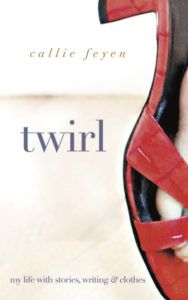During the early weeks of the nation’s isolation, I set to work organizing and rearranging my writing room. My plan was to take the doors off a small closet, take everything out, and shove my desk inside. I saw the idea on Pinterest.
I didn’t tell Jesse about my plan. I didn’t tell him because while he is the most wonderful man a gal could ask for, he is also an engineer with a passion for efficiency, calculations, and obtaining the correct answer. Jesse will not make a move until he knows he’ll succeed. I dash toward the “what if.” I lunge to the “let’s see what’ll happen.” I don’t consider success or failure — I think only about whether it is something I want.
I didn’t want to tell him about my project because I knew he would say it wouldn’t work. He’d measure the closet and the desk. He’d say we can’t do any rearranging until we get rid of the futon that’s also in that room. I didn’t want to hear that. I also wanted to figure this out for myself.
Which is how, one gorgeous spring evening while Jesse was grilling, I found myself in my writing room, stuck between my desk and the futon, both pieces of furniture and my legs at very uncomfortable angles. It turns out I don’t know how to take the doors off my closet, and besides, the desk doesn’t fit in there anyway. The only thing left to do, after figuring out how to painfully untangle myself from the monstrously sharp corners of the desk and futon, was to put everything back the way it was.
Nothing changed.
Like me, my mom loves to rearrange her home. It became one of the things she was known for when we were growing up. “Every time I come over,” my friends would say, “your house is different.” I enjoyed the constant change and grew to anticipate coming home from school to see what she’d done.
I suppose some might interpret this characteristic of ours as a symptom of boredom and restlessness. But my mom’s rearranging prompted me to re-see our home, and I think, my life. It felt like a metaphor for all the possible ways there were to do something, see something, even become something.
That’s what I wanted to do with the room where I write: re-see a thing or two; express something unsaid that I hadn’t considered, had forgotten about, or was waiting for the right time to be uncovered.
“Damn, Pinterest,” I said as I shoved the futon into the wall with my butt. “It’s where dreams go to die.”
That evening it was warm enough to open the window in my writing room, and I could smell the green of the season budding. It was mixed with the smell of the grill from our backyard. Birds were chirping for the first time this year. Hadley and Harper were on the volleyball court just beyond our backyard — sort of fighting, sort of laughing. It was well beyond 5 o’clock, but daylight was abundant.
I slid the desk back to where it had been, folded an old orange knitted blanket, placed it neatly back on the futon, and went outside to join my family.
The next morning I began my day as I have for a little over a year now — reading poetry. These days I’m working my way through Jeanine Hathaway’s Long after Lauds. That morning I read “Inexpressibly,” a poem about how to understand messages without the need to say them out loud.
“Of course that’s how silence reveals itself,” Hathaway begins her poem. She then writes about a forklift in reverse, a bug crashing “against my daughter’s high frequency curls,” and the “deafening deconstruction of this make-do bookmark, this postcard written by my mother days before she died.”
In my quest to rearrange my writing room, I went through every journal, file, and scrapbook that was crammed into the closet where I’d hoped to shove my desk. I found two handwritten recipe cards. One was a recipe for hummus written by my grandmother. She’d given it to me at a bridal shower my aunts organized a couple months before my wedding. The last direction my grandma wrote was, “If this is complicated, just call me, and I’ll come over and make it for you.”
The second one is written in Jesse’s hand, and it is for my mom’s French bread. She used to make a loaf every year for Thanksgiving, and at Christmastime she’d make one for our teachers. She’d tie red and green yarn around the loaves, and we’d take them to school with us. This bread was another thing my mom was known for. Once you taste it, you will plead for the recipe. And it’s not that my mom wasn’t happy to give the recipe away, but it was more that she knew it by heart and knew the only way to bake it is properly to do it yourself. You have to try again and again until what you’ve made is an expression and an extension of who you are. It’s bread only she can make.
Jesse, the sweet “if there’s a will there’s a way” guy that he is, didn’t understand that, and one afternoon called my mom, with pen and recipe card in hand, and requested that she give him the recipe. She obliged, and I watched while Jesse dutifully wrote down the directions (which are more like a conversation). Neither of us have mastered the recipe. It doesn’t bother me, but I think it makes Jesse a little crazy that he can’t get the result he wants despite meticulously following the instructions.
I think poetry helps to express unsaid things. Poetry gently uncovers what’s been forgotten or lost or sometimes hidden. That morning, reading Hathaway’s poem and considering the silence a piece of paper reveals, I realized that while I might not have successfully rearranged my writing room the way I imagined or hoped for, there is much in this room for me to re-see.
Try It
This week, write a poem about unsaid things, about something you are beginning to re-see, or about all that silence reveals.
Photo by A_Peach Creative Commons, via Flickr. Post by Callie Feyen.
Browse more poetry prompts
A Writer’s Dream Book
“Callie Feyen has such a knack for telling personal stories that transcend her own life. In my years in publishing, I’ve seen how hard that is—but she makes it seem effortless, and her book is such a pleasure. It’s funny, it’s warm, it’s enlightening. Callie writes about two of the most important things in life—books and clothes—in utterly delightful and truly moving ways. I’m impressed by how non-gimmicky and fresh her writing is. I love this book.”
- Poetry Prompt: Courage to Follow - July 24, 2023
- Poetry Prompt: Being a Pilgrim and a Martha Stewart Homemaker - July 10, 2023
- Poetry Prompt: Monarch Butterfly’s Wildflower - June 19, 2023


L.L. Barkat says
This just about broke my heart today: “If this is complicated, just call me, and I’ll come over and make it for you.”
The Pinterest thing, though, made me smile. 🙂